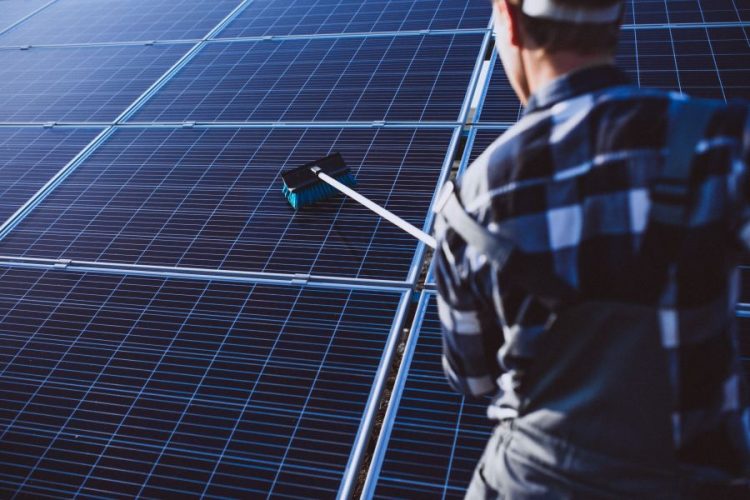How to Clean Solar Panels: A Step-by-Step Guide

Categories :
Solar panels can lose up to 30% efficiency due to dust, dirt, and debris. Regular cleaning ensures maximum energy output, extends lifespan, and prevents costly repairs. This guide covers the best cleaning methods, tools, and safety tips to maintain peak performance and protect your solar investment.
Solar power is expected to generate 10 per cent of the world's electricity by 2030, with much of it coming from desert regions where there is plenty of sunlight. However, a major challenge for these solar installations is the buildup of dust on the panels or mirrors. This dust can block sunlight and reduce the efficiency of the system. In just one month, dirty solar panels can lose up to 30 per cent of their power output, making regular cleaning essential.
Keeping clean solar panels helps maintain efficiency and ensures that solar farms continue producing electricity at their full potential.
Solar panels are a valuable investment for homeowners and businesses aiming to lower energy costs and support sustainability. However, their efficiency can decrease over time due to the buildup of dirt, dust, bird droppings, pollen, and other debris.
Regular maintenance and cleaning solar panels help them work at their best and last longer.
This guide explains how to clean solar panels, including the best cleaning methods, necessary tools, and common mistakes to avoid.
Why Cleaning Solar Panels Is Important
- Maximising energy output: Solar panels generate electricity by absorbing sunlight. When dust and debris cover the surface, less sunlight reaches the cells, reducing efficiency. Studies show that dirty panels can lose between 15–25 per cent of their energy output. Cleaning helps restore full efficiency and ensures panels generate the maximum amount of energy.
- Prolonging lifespan: Solar panels are built to last for many years, but dirt and grime can cause long-term damage. If not cleaned, dirt can lead to overheating or create tiny scratches on the surface, which may reduce performance over time.
- Reducing maintenance costs: Regular cleaning prevents major problems and reduces the need for expensive repairs or replacements. Panels that are cleaned frequently are less likely to suffer from operational issues compared to those that are neglected.
- Complying with warranty requirements: Some solar panel manufacturers include maintenance as part of their warranty terms. If the panels are not cleaned and maintained properly, the warranty may become invalid, leading to additional costs if repairs or replacements are required.
When to clean solar panels
The frequency of cleaning solar panels depends on different environmental conditions. Some areas require more frequent cleaning than others due to factors like pollution, dust, or salt in the air.
- Urban areas: Pollution from vehicles and factories can cause dirt to build up on solar panels. In these areas, cleaning every 6 to 12 months is recommended.
- Rural areas: Since there is less pollution, solar panels stay cleaner for longer. In most cases, cleaning once a year is enough.
- Coastal regions: Salt from the sea air can settle on panels, reducing their efficiency. To keep them working well, cleaning every few months is necessary.
- Desert climates: Dust storms and dry conditions lead to a quick buildup of sand and dust. In these areas, cleaning every three months helps maintain performance.
- Agricultural areas: Pollen and chemicals from nearby farms can settle on panels. Regular inspections and cleaning are important to prevent buildup.
- After storms or heavy rain: Strong winds and rain can leave dirt and debris on panels. After a storm, a quick inspection and light cleaning can help maintain efficiency.
Safety precautions before cleaning
Before cleaning solar panels, it is important to follow safety measures to prevent accidents and ensure effective cleaning.
- Turn off the system: Solar panels generate electricity, which can be dangerous when cleaning. Always switch off the solar inverter and disconnect the system before starting the cleaning process.
- Avoid cleaning in direct sunlight: Cleaning panels when the sun is strong can cause water to dry too quickly, leaving streaks or residue. The best time to clean is early in the morning or late in the evening when temperatures are lower.
- Wear proper safety gear: For solar panels installed on rooftops, a stable ladder and a safety harness should be used. It is important not to lean too far while cleaning. If the task seems unsafe, a professional cleaner should be considered.
- Check weather conditions: Cleaning during windy or rainy weather should be avoided. Wet surfaces can be slippery, increasing the risk of falling. Strong winds can also make using a ladder unsafe.
Tools and Equipment Needed
To clean solar panels effectively without causing damage, the right tools and materials should be used:
- Soft brush or sponge: Helps remove dirt and dust without scratching the surface of the panels.
- Non-abrasive cloth or microfibre towel: Used for drying panels without leaving streaks or residue.
- Mild detergent or soap solution: A gentle cleaner mixed with water helps remove grime. Harsh chemicals like ammonia or bleach should be avoided, as they can damage the panels.
- Hose with spray nozzle: A standard garden hose is effective for rinsing away dirt and soap residue. Pressure washers should not be used, as they can cause damage.
- Bucket of water: If a hose is not available, a bucket filled with clean water can be used as an alternative.
- Squeegee with an extension handle: Helps remove excess water and prevents streaks after rinsing.
- Telescopic pole or long-handled brush: Allows easy cleaning of hard-to-reach areas, reducing the need for climbing.
Step-by-Step Guide to Cleaning Solar Panels
Step 1: Inspect the anels
Before cleaning, it’s important to check the panels for any visible damage. Look for cracks, loose wires, or signs of corrosion. If any damage is found, it’s best to contact a professional before cleaning.
Step 2: Remove Loose Debris
Use a soft brush to gently remove dry dirt, leaves, or bird droppings from the surface. This helps prevent scratches when washing the panels.
Step 3: Rinse the Panels
Using a hose, spray water over the panels to loosen the dirt on the surface. Avoid using high-pressure washers, as they can damage the electrical connections or protective layers on the panels.
Step 4: Apply Soap Solution
Mix a small amount of mild detergent with water and apply it to the panels with a sponge or soft cloth. It’s important to avoid using harsh cleaning chemicals, as they can harm the panels.
Step 5: Scrub Gently
Use a soft sponge or brush to gently scrub the panels and remove any dirt or bird droppings. Never use metal brushes or abrasive materials, as they can scratch the surface.
Step 6: Rinse Thoroughly
Use clean water to rinse off all the soap residue. Make sure no detergent remains, as it can leave streaks or cause build-up.
Step 7: Dry the Panels
Allow the panels to air dry or use a squeegee to remove excess water for a streak-free finish.
Step 8: Final Inspection
Once the panels are dry, check them again to see if any spots are left. If needed, repeat the cleaning process to get the panels fully clean.
Alternative Cleaning Methods
- Self-cleaning solar panels: Some newer panels come with self-cleaning coatings or even robotic cleaners that automatically help remove dust and debris.
- Professional cleaning services: For large commercial installations or difficult-to-reach rooftop panels, hiring a professional cleaner can ensure proper cleaning without risking personal injury.
- Automated sprinkler systems: Automated sprinklers can help rinse the panels periodically, reducing the need for manual cleaning.
Common Mistakes to Avoid
- Using abrasive scrubbers: They can scratch the surface of the panels and reduce their efficiency.
- Cleaning panels while hot: Cleaning panels when they are hot from the sun can cause water streaks and make the dirt harder to remove.
- Using high-pressure washers: High pressure can damage wiring and protective coatings on the panels.
- Ignoring safety precautions: Roof-mounted panels need stable ladders and proper safety harnesses to avoid injury.
- Using harsh chemicals: Chemicals like ammonia, bleach, or alcohol-based cleaners can damage the protective coatings on the panels.
Frequently Asked Questions
Q.1. How often should solar panels be cleaned?
It depends on environmental conditions, but it is generally recommended to clean solar panels once or twice a year.
Q.2. Can rain clean solar panels?
Rain can help remove some dirt, but it is not enough to eliminate bird droppings, pollen, or dust that may have built up over time.
Q.3. Can vinegar be used for cleaning?
A diluted vinegar solution can be effective for removing grime. However, it should not be used excessively as it may damage the surface of the panels over time.
Q.4. What is the safest way to clean roof-mounted panels?
The safest way to clean roof-mounted panels is by using an extendable brush while standing on a secure ladder. If the panels are hard to reach, it is best to hire a professional.
Q.5. Do dirty panels reduce electricity production?
Yes, dirty panels can lose up to 25% of their efficiency, which can significantly affect energy savings.
Final thoughts
Regular maintenance and cleaning of solar panels are essential for maximising their efficiency, prolonging their lifespan, and preventing costly repairs. Understanding how to clean solar panels properly helps ensure optimal performance while avoiding potential damage.
By following the correct cleaning methods and safety precautions, homeowners and businesses can effectively maintain their solar investment. If the panels are difficult to access, professional cleaning services offer a safe and efficient solution.

Pallavi Singal is the Vice President of Content at ztudium, where she leads innovative content strategies and oversees the development of high-impact editorial initiatives. With a strong background in digital media and a passion for storytelling, Pallavi plays a pivotal role in scaling the content operations for ztudium’s platforms, including Businessabc, Citiesabc, and IntelligentHQ, Wisdomia.ai, MStores, and many others. Her expertise spans content creation, SEO, and digital marketing, driving engagement and growth across multiple channels. Pallavi’s work is characterised by a keen insight into emerging trends in business, technologies like AI, blockchain, metaverse and others, and society, making her a trusted voice in the industry.










